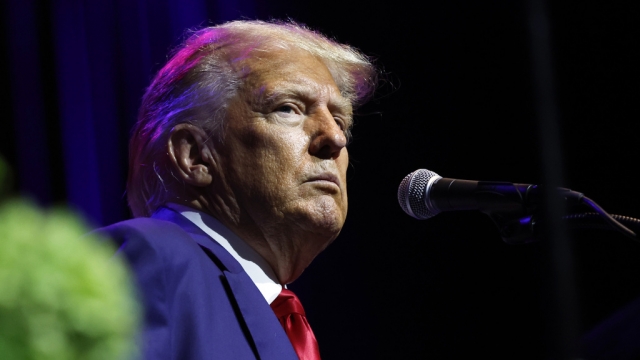A grand jury in Georgia indicted former President Donald Trump and eighteen of his allies over their alleged efforts to overturn election results in the state.
"The indictment includes 41 felony counts and is 97 pages long," said Fulton County District Attorney Fani Willis.
The prosecution is employing a statute known as "RICO," or the Racketeer Influenced and Corrupt Organizations Act of 1970.
It allows prosecutors to connect crimes that may appear unrelated but have a common broader objective and bring those crimes together into one case.
That means the head of a supposed operation can be included in criminal charges, even if they didn't carry out the crimes themselves.
In Georgia, the RICO statute is broader than the federal law, so it includes a wider list of possible crimes that can be bundled together.
The use of the RICO statute has gotten a lot of attention since it means the prosecutors are not required to prove Trump knew about or ordered each of the crimes committed, just that he was the alleged leader of the operation.
But it has also gotten attention because the RICO Act was originally passed by Congress as a tool to fight organized crime.
RICO was instrumental in the 1980s in bringing charges and eventual convictions against the mafia.
In one well-known case, then-District Attorney Rudy Giuliani used the law to take down the leadership of the so-called "Five Families" that operated out of New York.
SEE MORE: Georgia probes threats against grand jury in Trump election case
Giuliani is now one of the Trump allies charged in the Georgia case. Since then, the mafia's power has largely dissolved in the U.S. But RICO has been used against other institutions and organizations and has become an increasingly popular tool for prosecutors across the country. RICO cases were built against Wall Street traders, Major League Baseball, and, in multiple states, the Roman Catholic Church.
Earlier this summer, a civil lawsuit from a number of artists brought RICO charges against the fast fashion giant SHEIN, for alleged copyright infringement in clothing designs.
As RICO's use expanded beyond organized crime, some critics have argued the statute is too severe for some cases.
Some critics have warned the tool is too advantageous to the prosecution, arguing the bar to prove a connection between crimes is too low.
For example, a state investigation in Georgia found that nearly 180 educators had facilitated cheating on standardized tests across over 40 schools. The teachers with high-scoring students would receive bonuses, and they were threatened with demotion if they failed to meet targets.
In 2013, dozens of educators were indicted in a RICO case for crimes like making false statements, theft, and fraud.
Critics have pointed to this case as an example of the statute straying too far from its intended use and disproportionately being used against the underprivileged to bring more serious charges than they would've otherwise faced.
Willis, who was also a lead prosecutor in the RICO case against the Georgia Educators, is now leading the RICO case against Trump.
"I'm a fan of RICO. I've told people that. And the reason that I am a fan of RICO is [that] I think jurors are very, very intelligent. Some people don't want to do jury service, but once they get there, we really find that they're good citizens; they're very smart, they pay attention. They take these matters serious. But they want to know the whole story. They want to know what happened," said Willis.
The Georgia case against Trump will be a pivotal moment for the future of RICO cases and defining what it means to make up a "criminal enterprise" or organization. And as a sweeping case targeting efforts to overturn the 2020 elections rather than individual acts, the RICO indictment is a unique challenge to the former president.
Trending stories at Scrippsnews.com



